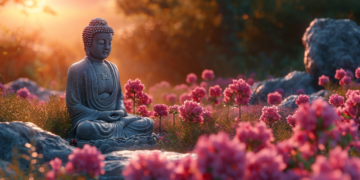“Do not let the act of envisioning your entire life overwhelm you. Avoid worrying about all potential future sorrows; instead, in each current situation, question what is truly intolerable and unbearable. Recognize that neither the past nor the future have an impact on this present moment. This way of thinking will help you face the present with greater clarity and without unnecessary worries.” Meditations 8.36 – Marcus Aurelius.
In the words of Marcus Aurelius, we find a timeless truth that resonates powerfully in our era of constant distractions and worries. “Focus on the present,” advises the philosopher emperor, a maxim that goes beyond a simple phrase to become a powerful Stoic tool for everyday life.
Let’s reflect on this passage. How often do we find ourselves caught in the web of our thoughts about the past and future? The mind, restless and wandering, often gets lost in a labyrinth of ‘what ifs’ and memories tinged with nostalgia or regret. Yet, Marcus Aurelius urges us to question what is truly unbearable in our current worries, suggesting that upon close examination, many of them will lose their power over us.
This leads us to a key question: How can we apply this wisdom in our daily lives? First, it is essential to recognize that the past and future are mere constructions of the mind, and that the only tangible reality is the present. This understanding allows us to focus on what is directly in front of us, thereby reducing the overwhelming burden of what could have been or what might be.
To practice this philosophy, we might start with mindfulness exercises. For example, in the midst of a hectic day, take a moment to center yourself on your breathing. Observe how each inhalation and exhalation anchors you in the present. This simple, yet powerful technique can help dispel the clouds of unfounded worries about the future or regret over the past.
Additionally, we can challenge our own perceptions of what we consider intolerable. When facing a difficult situation, ask yourself: Is this obstacle truly insurmountable, or is it my perception of it that makes it seem so? Often, by changing our perspective, we find that many of our struggles are manageable.
In our daily interactions, this approach teaches us to be fully present. Actively listening to others without the distraction of our own intrusive thoughts, or fully enjoying an activity without the anxiety of what comes next, can significantly enrich our experiences and relationships.
Marcus Aurelius’ advice is not a call to ignore the past or future, but rather a reminder not to let them dominate our present. By living with full awareness of the current moment, we not only alleviate our own anxieties but also open ourselves up to experiencing life more fully.
Lastly, this Stoic reflection invites us to ask ourselves: Am I truly living in the present, or am I lost in the shadows of the past and the illusions of the future? By posing this question, we open ourselves to the possibility of a more centered, conscious, and ultimately, more fulfilling and meaningful life.









